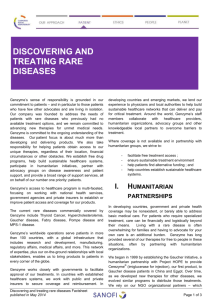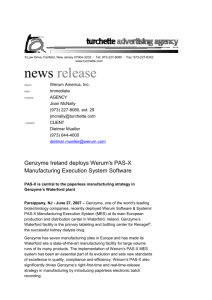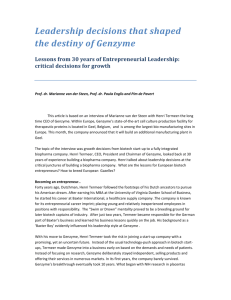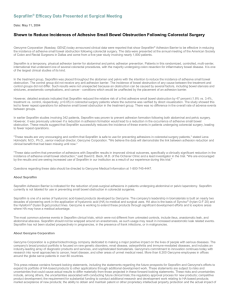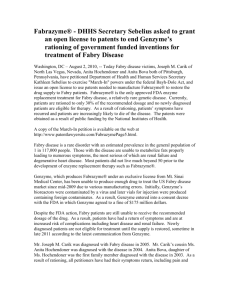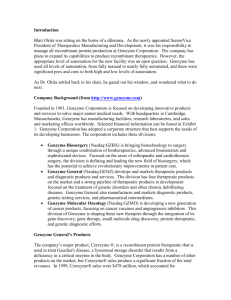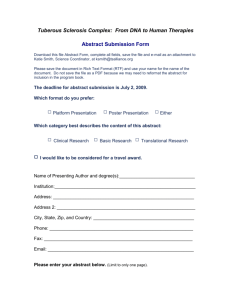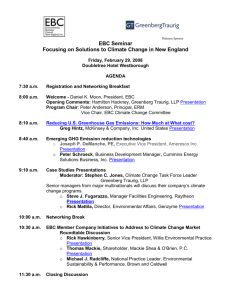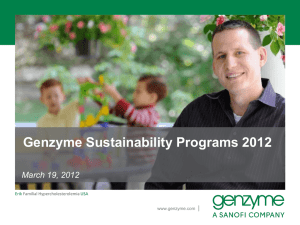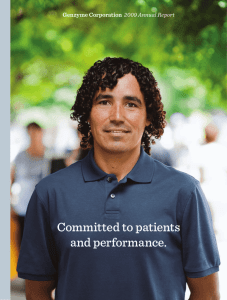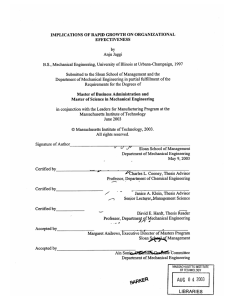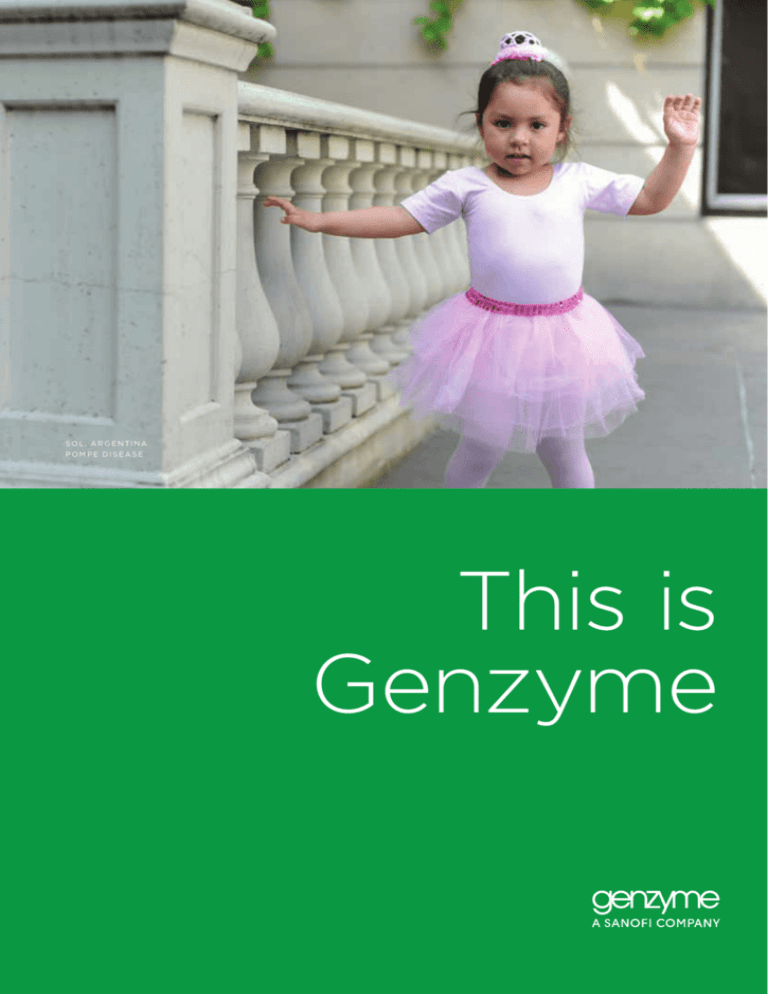
SOL, ARGENTINA
POMPE DISEASE
This is
Genzyme
MARIA, GAUCHER DISEASE
TONY, FABRY
DISEASE
MICHELLE,
MULTIPLE
SCLEROSIS
BRANT,
THYROID
CANCER
JIMENA, MPS I
GENZYME
Genzyme has pioneered the
development and delivery of
transformative therapies for
patients affected by rare and
debilitating diseases for over
30 years.
With a focus on rare diseases and multiple sclerosis, we
are dedicated to making a positive impact on the lives of
the patients and families we serve. As a Sanofi company,
Genzyme benefits from the reach and resources of one
of the world’s largest pharmaceutical companies, with a
shared commitment to improving the lives of patients.
GENZYME IN THE UNITED KINGDOM AND IREL AND
Genzyme is a significant force in the
biotechnology sector in the UK and Ireland
focused on improving the lives of patients
with rare genetic diseases and multiple
sclerosis.
First established in the UK in 1981, Genzyme
employs almost 100 people working out of
our commercial base in Oxford, marketing
products for the treatment of patients with
chronic debilitating diseases. These include
genetic diseases such as lysosomal storage
disorders (LSDs), characterised by a lack
of enzymes essential to healthy biological
processes, and multiple sclerosis, a complex
disease affecting the central nervous system.
Our portfolio also includes a therapy which
aids in the management of thyroid cancer.
Genzyme has operated a biotechnology
campus in Waterford, Ireland since 2001.
With 550 people working at a € 500m-plus
facility, Genzyme products are supplied
from Waterford to patients in more than 70
countries worldwide.
Additional Genzyme and Sanofi new product
introductions are planned at the Waterford site
which continues to expand its mandate across
multiple platforms. Genzyme Waterford has
been recognised as one of the country’s best
workplaces by Great Place to Work Ireland.
02 / GENZYME
A legacy of
LEADERSHIP.
Successfully bring an enzyme
replacement therapy into
clinical use
Develop a treatment for type
1 Gaucher disease
Genzyme
was first to…
Develop a treatment for
MPS I
Develop a treatment for
Pompe disease
Develop an adjuvant therapy
for thyroid cancer
Register a treatment for
Fabry disease in the U.S.
Launch two NICE approved,
reimbursed treatments for
relapsing remitting multiple
sclerosis (RRMS), in a
new therapy area, in the
same year
GENZYME / 03
We accomplish our goals through world-class research,
collaboration with the global patient community, and
with the compassion and commitment of our employees.
Our research and development is focused on delivering
breakthrough therapies for patients who might otherwise
have few or no treatment options.
Investigational oral
compounds for Gaucher
disease and Fabry disease
We continue
to invest in a
global pipeline
of innovative
therapies…
A potential treatment
for familial amyloid
polyneuropathy, codeveloped with Alnylam
A potential enzyme
replacement therapy for
Niemann-Pick disease type B
A second generation enzyme
replacement therapy for
Pompe disease
Research in Parkinson’s
disease and age-related
macular degeneration
04 / GENZYME
RARE DISEASES
Genzyme has long been a
leader in the development of
targeted therapies for rare
diseases. We put patients at
the heart of what we do. By
combining this patient focus
with our deep knowledge
of disease biology, our
groundbreaking science, and
our relationships with medical
specialists, we distinguish
Genzyme from new entries to
the rare disease field.
E VA A N D H E R S O N ,
A L B E R TO
FA B RY D I S E A S E
THERAPIES FOR
RARE DISEASES
IN THE UK AND
IRELAND
GENETIC DISEASES
Type 1 Gaucher disease, Fabry disease,
Pompe disease, MPS I disease
E N D O C R I N O LO G Y
Facilitating thyroid cancer treatment
and testing
GENZYME / 05
INNOVATIVE solutions
for rare diseases
Lysosomal Storage Disorders (LSDs), a group of
rare conditions caused by enzyme deficiencies,
are a cornerstone of Genzyme’s business, and
the medical area for which we are most wellknown. In 1984, we pioneered the first enzyme
replacement therapy to treat Gaucher disease,
which has transformed the lives of patients.
We continue to innovate. We have completed
our phase 3 trials for an oral therapy for patients
with type 1 Gaucher disease, which is approved
in the United States, has received marketing
authorisation in Europe and has been filed for
approval in other countries. We also contribute
our scientific expertise in the area of diagnostic
testing for LSDs.
Our breakthrough work in genetic engineering
and recombinant protein manufacturing has
made possible the large-scale production of
enzyme replacement therapies for several
previously untreatable LSDs, including Gaucher
disease, Fabry disease and Pompe disease.
We are applying our genetic expertise, built
through our work on LSDs, to other rare
and personalised medicine areas, including
endocrinology, often partnering to bring new
solutions to our patients.
Almost all of our enzyme replacement therapies
were the first — and in some cases are still the
only — treatments available to patients. We
remain committed to finding new life-changing
therapeutic solutions for patients who may have
little or no other alternatives.
Our recombinant form of thyroid stimulating
hormone (TSH) helps thyroid cancer patients
avoid hypothyroidism, while allowing ablation
of thyroid remnants. It also enhances reliable
diagnostic testing for the recurrence of
thyroid cancer.
06 / GENZYME
MULTIPLE
SCLEROSIS
We are committed to becoming
a long-term partner to the
multiple sclerosis (MS)
community by expanding on
our heritage of revolutionising
treatment for patients with
rare and debilitating diseases.
We are working to deliver
scientific advancements that
will make a positive difference
in the lives of patients with MS
and look forward to continuing
to enhance our portfolio and
serving patients’ needs.
TIGER,
M U LT I P L E S C L E R O S I S
THER APIES FOR REL APSING MS IN THE U K
AND IRELAND
Oral immunomodulator that inhibits the
proliferation of stimulated B & T lymphocytes
Infused monoclonal antibody that selectively
targets the cell surface protein CD-52
GENZ YME / 07
STRIVING to address
unmet needs in MS
For over a decade, Genzyme and Sanofi have
each been working to develop novel treatments
for MS, a debilitating, chronic disease in
which the immune system attacks the central
nervous system, causing symptoms ranging
from numbness in the limbs or forgetfulness
to paralysis or loss of vision. As part of the
process of merging the two companies, we have
integrated these programmes within Genzyme
to position ourselves as a leader in MS. We
are approaching the MS community with the
commitment, engagement, transparency and
focus on patients that define Genzyme. We
recognise that an individualised approach
to living well with MS involves developing
relationships with patients through patient
organisations and foundations and care partners,
and health care providers.
We collaborate with physicians in research and
healthcare improvement while we continue
to push the boundaries of MS research in our
own laboratories. We further support MS nurse
specialists and patient groups in their work to
foster close connections with patients and their
families, to best understand their needs and to
develop and improve healthcare delivery.
Our MS leadership comprises experienced
professionals with a strong foundation in MS.
We have an exciting opportunity to draw on the
diverse experiences of our MS team to forge
a unique identity for Genzyme within the MS
community.
Our MS therapeutic portfolio includes a oncedaily, oral therapy for relapsing remitting multiple
sclerosis (RRMS) and a novel infusion therapy
for RRMS that is given as two annual treatment
courses. Both therapies are available on the NHS
in England, Scotland, Wales, Northern Ireland,
and in the Republic of Ireland.
G
Prix alien
Highly Commended 2014
M O N O C LO N A L A N T I B O D I E S : B R E A K T H R O U G H D I S C OV E RY BY U K S C I E N T I S T S I N T H E 70 S
The science of monoclonal antibodies goes
back to the seventies when two scientists,
César Milstein and George Köhler, from
Cambridge’s MRC Laboratory of Molecular
Biology invented the technology for making
large quantities of an antibody targeted
at one specificity, so-called monoclonal
antibodies; for which they subsequently
received the Nobel Prize for Physiology or
Medicine in 1984. Building on this research,
Professor Herman Waldmann and colleagues
at the University of Cambridge produced
the first monoclonal antibody for potential
use as a medicine, Campath-1H (Cambridge
Pathology 1st Human). In 1990, Professors
Waldmann and Alastair Compston began
discussions over the use of Campath-1H in
multiple sclerosis. Subsequently renamed
alemtuzumab, it was first used in 1991 at the
University of Cambridge for treating patients
with secondary progressive multiple sclerosis.
08 / GENZYME
SCIENCE
is at the
core of
what we do.
G LO B A L R E S E A R C H A R E A S :
Rare Genetic
Diseases
Neurologic
Diseases
Cardiovascular
Diseases
Endocrinology
Immunology
GENZYME / 09
Research at Genzyme is a core part
of our commitment to improve the
lives of patients and their carers and is
concentrated in medical areas where new
therapies can have a significant impact,
including our primary areas of focus —
rare diseases, immunologic and neurologic
disorders.
Inspired by the potential to improve
therapy for type 1 Gaucher disease, which has
patients’ lives, Genzyme’s scientists work
completed phase 3 trials.
at the forefront of healthcare research and
technology. Our scientists are part of a
Continued research in the field of multiple
broader Sanofi research organisation located
sclerosis (MS) seeks to develop well tolerated
out of Boston, U.S. Beyond our own labs, we
and effective treatments that are accessible
collaborate with investigators at universities,
to everyone living with MS. A key focus for
research institutions, private companies,
our scientists is to develop a treatment that
and government organisations to discover
is aimed at repairing the myelin sheath.
and develop treatments for patients in need
around the world.
We have a robust research effort in the area
of immunologic and neurologic diseases,
Genzyme’s groundbreaking research in
expanding our research into neuropathic
enzyme replacement therapies for lysosomal
LSDs, lupus, spinal muscular atrophy and
storage disorders (LSDs) was the foundation
Huntington’s disease. We also have one of
of our business. Today, we are still widely
the industry’s longest standing and largest
recognised as the global leader in LSD
research programme in the field of gene
research and have expanded our efforts. We
therapy, including a research collaboration
are developing a therapy to treat Niemann-
with the University of Florida and University
Pick disease type B, a new therapy for Pompe
of Pennsylvania to develop a gene therapy
disease, and exploring targets for cystic
for the treatment of a rare genetic disease
fibrosis and myotonic dystrophy. We are
that causes childhood blindness. We are
applying our expertise to develop new forms
exploring targets in several genetic diseases
of treatment delivery that are more convenient
and have clinical trials to advance treatments
for patients than intravenous enzyme infusions
in Parkinson’s disease and age-related macular
— such as our oral therapy in preclinical
degeneration.
development for Fabry disease and our oral
10 / GENZYME
Ensuring Access
We continue to expand our
manufacturing capacity and we
remain committed to delivering
quality product to patients.
From 2012-2015, approximately
£620m ($1B) will be invested
in our global manufacturing
operations.
Our new Framingham,
Massachusetts, U.S. facility
(above) joins our robust
manufacturing network
which includes Geel, Belgium,
Waterford, Ireland (left) and
Allston, Massachusetts, U.S.
GENZYME / 11
Genzyme has locations in more
than 40 countries and our
products are available in nearly
100 countries.
R E S P O N S I B I L I T Y Our dedication to patients extends beyond the
development and manufacture of products. We have initiated
numerous free-drug, payment-assistance, and humanitarian
programmes to help ensure that treatment reaches all those who
need it, regardless of their ability to pay. We are also committed
to responsible corporate citizenship: we lead the industry in
environmental initiatives and support local communities through
grants and volunteering initiatives.
C H A R I TA B L E P R O G R A M M E S
C O M M U N I T Y R E L AT I O N S
E N V I R O N M E N TA L I N I T I AT I V E S
We believe that developing
lifesaving therapies carries
with it the responsibility to
increase access to these
therapies for patients around
the world through free-drug
programmes, humanitarian
initiatives, education and
advocacy. Genzyme sponsors
a range of programmes to help
ensure that patients have access
to the treatments they need.
These programmes include
the International Charitable
Access Programme (ICAP)
which provides, to the best of
our ability, our four enzyme
replacement therapies, focused
on specific regions, such as
Eastern Europe, India, and China.
We partner with schools,
nonprofit agencies and
grassroots organisations in
our communities. Through
a combination of grants,
employee involvement and
in-kind contributions, we build
sustainable relationships that
have a lasting positive impact.
We are among corporate leaders
in environmental management
and performance.
We develop and fund innovative
science education programmes
for young people, and we
also fund community-based,
nonprofit organisations
dedicated to health-related
issues.
As part of the Sanofi Group
commitment to promoting
a sustainable future we are
reducing our CO2 emissions
in business travel, company
car use and general energy
consumption. There are also
separate initiatives to increase recycling and dramatically reduce
water consumption across our
manufacturing facilities.
We will continue to explore
new ways to improve our
environmental performance.
12 / GENZYME
Patients are people like us. We all laugh and
cry. We hope and dream. We have family and
friends who love us. We want to lead normal
lives. This is why we do what we do.
O N E PAT I E N T ’ S J O U R N E Y
Brian Berman
Gaucher disease
“My mother played an important role
in the early development of Gaucher
disease treatment and she was just
tremendous, and an amazing role
model for me. I know the doctors told
her that I was going to die but her
perseverance, dedication and ability
to work closely with Genzyme and
search around the world to develop
a treatment was amazing. There was
tremendous excitement being part of
the development of a new medicine.
1983
1991
Today, my health is very good. I am a
father of small children. I lead a very
normal, very active, healthy life. My
thoughts and wishes for the future
concerning rare diseases are that
there’s hope. Today, I would say to
other people living with a rare disease,
don’t give up. There will be new
treatments for rare diseases which
don’t currently have any treatments.
I believe people like us with rare
diseases can live normal lives.”
2001
2012
DAV I D M E E K E R , M D , P R E S I D E N T A N D C E O
We talk a lot about the fact
that we are a company
with a purpose: our
extraordinary commitment
to understanding and meeting
the needs of patients and
their families. It is that sense
of purpose that will allow us
to be successful as we look
toward our future.
Our mission is to discover and deliver
transformative therapies for patients
with rare and special unmet medical
needs, providing hope where there
was none before.
Genzyme Therapeutics Ltd
4620 Kingsgate
Cascade Way
Oxford Business Park South
Oxford OX4 2SU
UNITED KINGDOM
www.genzyme.co.uk
© 2015 Genzyme Corporation Genzyme ® is a registered trademark of Genzyme Corporation. All rights reserved.
Genzyme Ireland Ltd.
IDA Industrial Park
Old Kilmeaden Road
Waterford
IRELAND
www.genzyme.ie
GZUK.GZ.14.10.0113 FEBRUARY 2015

